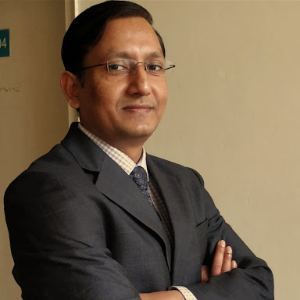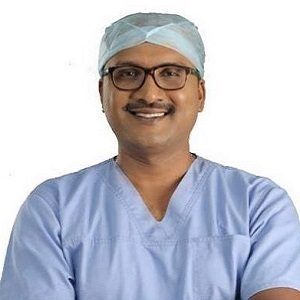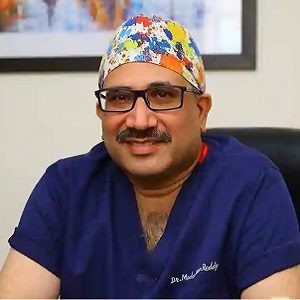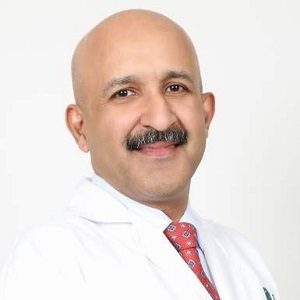Best Doctors in India for Birmingham Hip Resurfacing Surgery
- Orthopedic & Spine Surgeon, New Delhi, India
- Over 14 years’ experience
Profile Highlights:
- Dr. Om Prakash Gupta is a reputed Spine Surgeon in India.
- He is currently functioning as a Consultant – Orthopedics & Spine at Max Smart Super Speciality Hospital, New Delhi
- He has over 14 years of experience.
- Orthopedic Surgeon, Chennai, India
- Over 21 years’ experience
Profile Highlights:
- Dr. A Navaladi Shankar is a well-known spine surgeon and orthopedist in Chennai with 21+ years of experience.
- He completed an MBBS from Al-Ameen Medical College, MNAMS from the National Board of Education, and a Diploma from Sri Ramachandra Medical College and Research Institute.
- Dr. Shankar holds expertise in Laminectomy, Lower Back Pain and Neck Pain Treatment, Arthritis Management, and Trauma Surgery.
- Orthopaedic Surgeon, Chennai, India
- Over 22 years’ experience
Profile Highlights:
- Dr. Kornad P Kosygan is one of the few Orthopedic surgeons in India with a double FRCS degree.
- He has been successful in the diagnosis and treatment of severe Orthopedic problems throughout his career.
- Dr. Kornad is invited as an exclusive Orthopedics Specialist from over six countries in the Asian and European subcontinent.
- Dr. Kosygan has sought extensive training and exposure in the department of Orthopaedics.
- Orthopaedic Surgeon, Chennai, India
- Over 25 years’ experience
Profile Highlights:
- Dr. Madan Mohan Reddy is one of the most acclaimed Orthopedic Surgeons in India with tons of experience and knowledge that he gained over the course of years.
- He has attended several courses across the world, in countries like Switzerland, Germany, Australia, and Italy.
- Orthopedic Surgeon, New Delhi, India
- Over 42 years’ experience
Profile Highlights:
- As one of the most experienced orthopedic surgeons in Delhi, Dr. Chander Shekhar has been practicing for 42 years. He is associated with Indraprastha Apollo Hospital as a consultant.
- Dr. Chander Shekhar is interested in Knee and Hip joint replacement and revision.
- He honed his expertise by completing a fellowship in shoulder and knee arthroscopy in the United States. Besides replacement & revision surgery, he has expertise in Birmingham Hip Resurfacing, BHR with stem, and Minimally Invasive Surgery.
- Orthopedic Surgeon & Spine Surgeon, New Delhi, India
- Over 18 years’ experience
Profile Highlights:
- Dr. Amit Kumar Agarwal is a Delhi-based orthopedic, joint replacement, and spine surgeon consultant who has been assuring joint and spine health for about 18 years.
- Dr. Agarwal has garnered numerous accolades for his work in treating Joints and Musculoskeletal Disorders, pain management, sports injury, and articular degeneration during his career.
- Orthopedic Surgeon, New Delhi, India
- Over 22 years’ experience
Profile Highlights:
- Dr. Vibhu Bahl is one of the finest Orthopedist and Joint Replacement Surgeon in India. He has experience of over 22 years in this field.
- Dr. Bahl has successfully performed multiple complex and primary total knee and hip replacements over his career. Besides these, he specializes in computer-assisted total knee replacements. Patients seeking Arthroscopy for shoulder dislocation, degeneration, and repair must consult him.
- Dr. Bahl participated as a Faculty in many Arthroscopy conferences.
- He is passionate about research and has a long list of publications in prestigious national and international journals.
- Orthopedist, New Delhi, India
- Over 20 years’ experience
Profile Highlights:
- Dr. Havind Tandon is one of the best Orthopedists in Delhi, having nearly two decades of experience. He practices as a senior consultant at Indraprastha Apollo Hospital.
- Many patients who need a knee replacement, repair, or osteotomy have benefitted from his enthusiasm and skill in the field.
- Dr. Havind Tandon worked with Jhonson & Jhonson as a Facilitator for the National Joint Replacement Program.
- Pain management counseling, Joint Replacement Surgery, Spinal Therapy, reverse shoulder replacement, neuropathy assessment, foot drop, treatment of complex fractures, and Adult Joint Reconstruction are just a few of the vital services provided by Dr. Havind Tandon.
- Dr. Tandon was also recognized for his work in the field of research.
- Orthopedic and Spine Surgeon, Gurugram, India
- Over 25 years’ experience
Profile Highlights:
- With over 25 years of experience, Dr. Rajesh Kumar Verma can be generally considered a boon for people suffering from complex, bone, joint, or spine disorders.
- Currently known as one of India’s leading spine experts in India, Dr. Rajesh Kumar Verma performs as many as 50 surgeries in a month. The types of surgeries he performs include all types of spine surgeries, joint replacements, as well as complex trauma surgeries.
- Orthopedic Surgeon, Chennai, India
- Over 25 years’ experience
Profile Highlights:
- Dr. Krishnamurthy K provides consultation at the Apollo hospitals of Chennai.
- He has also worked as a senior registrar and assistant surgeon earlier and has sound knowledge of his field.
- One can reach Dr. Krishnamurthy K for treatment of fractures, joints, shoulders, knees, hip replacement, etc.
Best Hospitals in India for Birmingham Hip Resurfacing Surgery
Fortis Hospital, Shalimar Bagh
- City: New Delhi, India
Hospital Highlights:
- Fortis Hospital in Shalimar Bagh is a multi-super specialty hospital that strives to provide world-class patient care by leaving no stone unturned.
- Fortis, Shalimar Bagh, with 262 beds and a 7.34-acre footprint, provides the best level of medical care through its team of doctors, nurses, technicians, and management professionals.
Reliance Hospital, Mumbai
- City: Mumbai, India
Hospital Highlights:
- Reliance Hospital is one of the best super-specialty care hospitals in Navi Mumbai.
- The main purpose of this hospital is to become a trustworthy place for the best health and hope for society. The hospital is well connected to the suburbs of Mumbai and Navi Mumbai.
- The hospital has various specialty departments, viz., Accident & Emergency, Anesthesiology, Dental Services, Dermatology, Diabetology, Dietetics Nutrition, Endocrinology, ENT, Gastroenterology, General Surgery, Gynaecology And Obstetrics, Hepato Pancreato Biliary Surgery, Infectious Disease, Internal Medicine, Interventional Radiology, Laboratory Medicine, Minimal Access Laparoscopic Surgery, Nephrology, Neurosciences, Opthalmology, Orthopaedics, Paediatrics, Pain Management Palliative Care, Physical Medicine Rehabilitation, Plastic And Reconstructive Surgery, Psychiatry, Pulmonary Medicine, Radiology, Rheumatology, Transplant, Urology Andrology, Vascular Surgery
Lilavati Hospital & Research Centre, Mumbai
- City: Mumbai, India
Hospital Highlights:
- Lilavati Hospital & Research Centre is India’s premier multi-speciality tertiary care hospital and has been recognised as a global medical excellence centre.
- Lilavati Hospital & Research Centre has built an unrivalled level of trust with its patients over the years, thanks to a solid foundation that comprises cutting-edge facilities, the best medical competence, research, education, and charity endeavours.
- The hospital is quite proud of the fact that it now serves patients from all kinds of backgrounds, not just from the United States but from all around the world.
- The hospital has a total of 323 beds, one of the largest Intensive Care Units (ICUs), 12 Operation Theatres with modern amenities, over 300 consultants, and almost 1,800 personnel.
Venkateshwar Hospital, Dwarka, New Delhi
- City: New Delhi, India
Hospital Highlights:
- State-of-the-art technology and devoted healthcare professionals have been brought together under one roof at Venkateshwar Hospital to provide genuine medical care. The hospital’s professionals work together as a team to deliver the best possible treatment to their patients, using the most sophisticated equipment and information technology.
- Venkateshwar Hospital’s mission is to attain global excellence in healthcare by employing evidence-based, ethical clinical practices and cutting-edge technology by a team of highly skilled experts.
MGM Healthcare, Chennai
- City: Chennai, India
Hospital Highlights:
- Located in Chennai, India, MGM Healthcare is a top multispecialty hospital that provides all medical services under one roof.
- Since its founding in 2019, MGM Healthcare has quickly become a leading national referral centre, creating several innovative flagship initiatives.
- MGM Healthcare combines next-generation medical and digital technologies to provide better patient results.
- With 12 centres of excellence, more than 400 inpatient beds, 100 intensive care unit beds, and 24/7 emergency care, MGM Healthcare leaves no chance in redefining the patient experience in Chennai.
- MGM Healthcare boasts 250+ expert doctors across 30+ departments, including Cardiology, Pulmonology, Neurology, Obstetrics & Gynaecology, and more.
- They house 12 specialized Centres of Excellence, including Neurosciences, Orthopaedics, and Multi-Organ Transplantation.
- Their team of doctors, nurses, and paramedics works together to give every patient individualized treatment.
Birmingham Hip Resurfacing
The Birmingham Hip Resurfacing Surgery is a surgical procedure first introduced in the United Kingdom by manufacturer Smith & Nephew in 1997 and is currently implemented in over 26 countries as a medical alternative to Total Hip Replacement. The surgical procedure is recommended for patients who suffer from bad or worn out hip problems as the procedure aims to relieve intense hip pain and stiffness by ‘resurfacing’ a portion of the damaged hip bone.
What is Hip Resurfacing and how is it Different from Hip Replacement?
The Birmingham Hip Resurfacing surgery (BHR) is an alternative medical option to Total Hip Replacement (THR) where doctors place a mushroom-top cap over the head of the femur bone and another matching metal mushroom cap on the pelvis socket. Before the metal caps are inserted, a small part of the damaged bone is shaved or ‘resurfaced’. On movement of the hip bone, the joints produce a synovial fluid that acts as lubrication between the two metal surfaces and this pain from bone friction or stiffness is eliminated.
This procedure differs from the traditional hip replacement method where the entire hip joint is replaced completely leading to maximum bone loss, a situation that might not be favorable for younger patients. However, the hip resurfacing surgery needs to be done under an experienced medical team since it involves careful alignment of the metal caps in order to avoid future complications after the surgery.
When does a doctor recommend BHR?
Hip damage can be caused by different arthritis types such as osteoarthritis or rheumatoid arthritis, trauma etc. Conditions like bone tumour, avascular necrosis or dysplasia too can cause hip bone damage. Conditions like these affecting young patients can cause permanent hip bone damage but medical treatments like a total hip replacement surgery can prevent any possible future surgery options in young patients. Doctors hence recommends hip resurfacing surgery which preserves future surgical treatment options.
Birmingham Hip Resurfacing benefits
- The hip resurfacing surgery allows maximum bone conservation and is considered an apt medical treatment, especially for younger male patients ( less than 50-60 years old).
- The BHR success rate worldwide has been 90.2% to 98.6% making this medical procedure one of the most recommended treatment technique.
- Effect of the hip resurfacing surgery is known to last much longer than hip replacement method which makes it apt for long-term results.
- This medical procedure has the fastest recovery rate with documents revealing how some patients could go back to normal leg functioning within just 4 hours of the surgery. The usual time for complete recovery is 2-3 weeks within which the patient can go back to their normal life.
- This medical procedure also reduces hip dislocation complications significantly.
Common Diagnostic Tests Before Hip Resurfacing Surgery
Before recommending the surgery, your doctor or medical team might run a few clinical exams to diagnose the exact cause of the underlying condition and to determine whether hip resurfacing surgery is the best medical option for your condition or not. Usual tests may include physical tests or movement tests to determine the exact location or intensity of the pain. Doctors may ask about your medical history or possible bone or hip complication of the past and may ask for MRI or ECG results to determine whether the condition is merely related to the bones or does it have neurological complications involved. Doctors may also prescribe other necessary clinical exams if needed to understand the condition better.
Birmingham Hip Resurfacing Surgery Process
Preparation
There are no exclusive preparations needed for this procedure. Patients should inform the medical team of any past or present medical condition including intake of any daily medicine like antibiotics, blood thinners, pain killers, herbal or vitamin supplements, homeopathy doses, etc. You can ask your doctor for a detailed dietary chart to follow before the surgery. Doctors usually recommend no eating or consuming alcohol 12 to 10 hours before the surgery.
Procedure
The detailed procedure for this surgery may vary from patient to patient based on their surgical condition. Generally, an orthopaedic surgeon conducts the surgery with the help of a medical team and the entire procedure takes about 2-3 hours in total. This is a two-part surgery.
Step 1
Step 1 starts with the patient undergoing local or full anaesthesia to avoid any pain or discomfort during the procedure. The surgeon will then make a small incision in the patient’s thigh, preferably in the back to reveal the femoral bone once it’s been taken out of the hip joint socket. The top of the femoral bone is then trimmed or shaved with the help of surgical instruments and the doctor fits a metal cap over the head. This concludes the first part.
Step 2
Step 2 of the procedure starts with shaving or trimming the damaged bone or cartilage lining the pelvic socket before another metal cap is fitted into the socket. The surgeon now places the femoral bone back into the socket and aligns the metal-to-metal implant. The procedure ends with the surgeon closing the incision.
The Hip Resurfacing Surgery is Not Appropriate on these conditions:
- If the patient is pregnant
- If the patient’s bone health is weak or filled with multiple cavities
- If the patient has a kidney disorder
- If the patient is sensitive to metal
- If the patient is overweight or obese
- If the patient has chronic blood or bone infection
- If the patient has an immunity disorder due to diseases such as AIDS.
Risk Factors of Birmingham Hip Resurfacing Surgery
- Blood Clot
- Bone infection
- Bleeding Disorder
- Injured Nerves in and around the operation area
- Femoral fracture
Birmingham Hip Resurfacing Surgery Precaution & Care
Pain or soreness in the muscle or hip joint is normal after the surgery. The pain or soreness might be prominent near the incision area including chances of fluid leaking in and around the incision. While doctors prescribe pain medications for the soreness, fluids yellow or white in colour should be reported to the doctor immediately, especially, if the fluid draining is accompanied by redness or swelling. However, minimum fluid leakage is actually normal for this treatment.
There are no special diet regulations but it’s always better to check in with the medical team regarding diet to avoid interaction with medications prescribed. Based on your recovery rate, the medical team may ask for imaging scans or will advise you for physical therapy. A cane or a crutch for the initial recovery days might also be prescribed. Doctors will also determine when the patient can start applying pressure or go back to their normal lifestyle.
FAQs
How long do I have to stay in the hospital after a hip resurfacing surgery?
About 4-5 days hospital stay is needed.
How fast can I recover from the hip resurfacing surgery?
Usually, patients can start walking after 4 hours of the surgery, but that is completely based on the patient’s recovery rate. Doctors usually keep 2-4 weeks as the general recovery period.
Do I have to undergo hip resurfacing a second time?
Taking wear and tear into account, patients after 10-20 years might have to reappear for a resurfacing or total replacement surgery based on their condition.
Is this surgical procedure safe?
This surgery was approved by FDA in 2016 and so far 3000+ hip resurfacing surgeries with successful results have been performed.
Can I run after my hip resurfacing surgery?
Clinical documentations say running is possible after this surgery. However, long-term effects such as wear and tear are not calculated in this documentation. Your doctor will be able to guide you better on this.
















